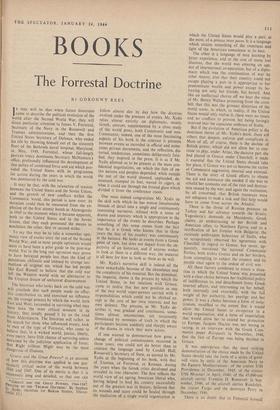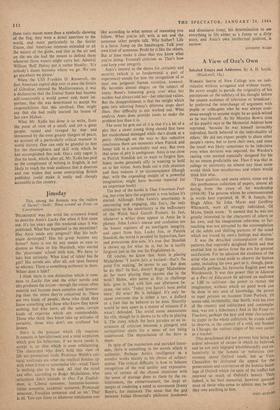BOOKS
The Forrestal Doctrine
By GORONWY REES T may well be that when future historians
1
come to describe the political evolution of the world after the Second World War, they will direct particular attention to James V. Forrestal, Secretary of the Navy in the Roosevelt and Truman administrations, and then the first United States Secretary of Defence, who ended his life by throwing himself out of the sixteenth floor of the Bethesda naval hospital, Maryland, in May, 1949. Forrestal, whose full-length portrait' today dominates Secretary McNamara's office, profoundly influenced the development of that policy of combined force and aid which pro- vided the United States with its programme for action during the years in which the world was dominated by the cold war.
It may be that, with the relaxation of tension between the United States and the Soviet Union, and the growth of new' conflicts within the Communist world, this period is now over; its duration could then be measured from the ex- plosion of the first atomic bomb at Alamogordo in 1945 to the moment when it became apparent, both to the United States and to the Soviet Union, that they each possessed the means to annihilate the other, first or second strike.
To say this may be to take a somewhat opti- mistic view of events since the end of the Second World War, and to most people optimism would seem to have been a pcior guide to the post-war world. Yet in the long run optimism may prove to have betrayed people less than the kind of Pessimism, chiliastic and imbued by strange inti- mations of original sin, which has led people like Earl Russell to believe that the cold war left the Western world with no alternative to the Utopian dream of unilateral disarmament.
The historian who looks back on the cold war will conclude that such people made no effec- tive contribution to, and exercised no influence on, the strange process by which the world, both East and West, succeeded in surviving what may have been the most critical moment in its history; they simply passed it by on the road from Aldermaston. The historian will rather, in his search for those who influenced events, look to men of the type of Forrestal, who came to believe that, in a wicked world, justice, liberty, even mercy, have little chance of surviving unless sustained by the judicious application of force; that Right without Might may be the most dangerous of illusions.
Greece and the Great Powers* is an account of how this doctrine was applied in one par- ticularly critical sector of •the world between 1944 and 1947. One of its merits is that it is immensely long and detailed, so that one can GREECE AND THE GREAT POWERS, 1944-1947. PRELUDE TO THE 'TRUMAN DOCTRINE.' By Stephen loniki Xydis. (Institute for Balkan Studies, Thessa- , 0.)
follow almost day by day how the doctrine evolved under the pressure of events. Mr. Xydis relies almost entirely on diplomatic, mostly Greek, sources, supplemented by a close study of the world press, both Communist and non- Communist; indeed, one of the most fascinating aspects of his book is the contrast it presents between events as recorded in official and some- times private documents, and the reflection, dis- torted, tendentious, sometimes deliberately falsi- fied, they inspired in the press. It is as if Mr. Xydis allowed us to be present at the most con- fidential negotiations, on which the fate of en- tire nations and peoples depended, while outside the rest of the world shouted, applauded, de- nounced, stamped its feet, waved its cigars, at what it could see through the frosted glass which divided it from the conference room.
One must indeed congratulate Mr. Xydis on the skill with which he has woven innumerable threads of detail into a single and continuously interesting narrative, infused with a sense of drama and intensity which is appropriate to the importance of the events he describes. Perhaps something of this sense comes from the fact that he is a Greek who knows that in those years the fate of his country was continuously in the balance. He looks at events from a Greek point of view, but does not depart from the ob- jectivity of an historian, and if anyone wishes to look at them in a different way, the material is all here for him to look at them as he will.
Mr. Xydis's narrative skill is indeed- all the more remarkable because of the abundance and the complexity of his material. But the dominant, the imperial, theme is the process by which the United States, in her relations with Greece, came to realise that her new position as one of the two world super-powers carried with it responsibilities which could not be shirked ex- cept at the cost of her own interests and her own defence. The process, as Mr. Xydis de- scribes it, was gradual and continuous, some- times almost unconscious, yet recurrently illuminated by moments of truth in which the participants became suddenly and sharply aware of the drama in which they were actors.
If one wanted to demonstrate how great a change of political consciousness occurred in those years, one could not do better than to contrast the language used by Cordell Hull, Roosevelt's, Secretary of State, as quoted by Mr. Xydis at the beginning of his book, with that of Truman, or Forrestal, or Kennan, during the years when the Greek crisis developed and revealed its true character. The first reflects the world view of an ageing American liberal who, having helped 'to lead his country successfully out of the greatest war in history, believed that its wounds and scars could be healed through the mediation of a single world organisation in
which the United States would play a part, at the most, of a prinzus inter pares. It is a language which retains something of the sweetness and light of the American conscience at its best.
The other is a language of men learning by bitter experience, and at the cost of many lost illusions, that the world was entering an age, not of international co-operation, but of a diplo- macy which was the continuation of war by other means; also that their country could not escape playing a part in it appropriate to her predominant wealth and power except by be- traying not only her friends, but herself. And like an ineffectual chorus off we hear the voice of Mr. Henry Wallace protesting from the corn- belt that this was the grossest distortion of the world scene, in which, in reality, if the United States would only realise it, there were no issues and no conflicts to prevent her being lovingly received into the capacious embrace of Stalin.
But if the evolution of American policy is the dominant theme of Mr. Xydis's book, there ar6 others that deepen, enforce and complicate it. Most of all, of course, there is the decline of British power, which did not allow her to con- tinue to play, under Attlee, the decisive part she had played in Greece under Churchill; it made it essential that the United States should take her place, if Greece was not to become the victim of Communist aggression, internal and external. There is the story of Greek efforts to obtain the aid and assistance she needed if -she was to rebuild her economy out of the ruin and destruc- tion caused by the war; and again the realisation, by all concerned, that British resources were not adequate to suoh a task and that help would have to come from across the Atlantic.
There is the threat of Russian pressure on Turkey and her advance towards the Straits; Yugoslavia's demands on Macedonia; Greek claims, so embarrassing to her British and American allies, to Northern Epirus and to a rectification of her frontier with Bulgaria; the curiously ambivalent behaviour of Stalin, who so scrupulously observed his agreement with Churchill in regard to Greece, but never, ap- parently, restrained the national Communist Parties, both within Greece and on her borders, from attempting to subject the country and its people once again to the ordeal of civil war.
All these factors combined to create a situa- tion in Which the United States was presented with a clear choice between her traditional policy of indifference to, and detachment from, Greek internal affairs, and intervening on her behalf, both internally and externally, with the full weight of her authority, her prestige and her power. It was a choice between a form of isola- tionism, modified to the extent that it would allow the United States to . co-operate in a world organisation, and a form of imperialism that would allow her to extend her protection to Europe. Jacques Duclos was not wrong in saying, in an interview with the Greek Com- munist paper Rizopastis in November, 1946, that the fate of Europe was, being decided in Greece.
It was appropriate that the most striking demonstration of the choice made by the United States should take the form of a series of good- will visits by units of the American Navy to the Eastern Mediterranean : of the cruiser USS Providence in December, 1945; of the cruiser USS Missouri in April, 1946; of the 45,000-ton aircraft carrier Franklin D. Roosevelt in Sep- tember, 1946;' of the aircraft carrier Randolph, the cruiser Fargo and the destroyer Perry in December, 1946.
There is no doubt that to Forrestal himself these visits meant more than a symbolic showing of the flag; they were a direct assertion to the world, and more particularly to the Soviet Union, that American interests extended to all the waters of the globe, and that in the air and on the sea she had the means to defend them wherever those waters might carry her. Admiral William 'Bull' Halsey put it rather bluntly: 'It's nobody's damn business where we go. We can go anywhere we please.'
When the USS Franklin D. Roosevelt, the first American capital ship ever to pass the Straits of Gibraltar, entered the Mediterranean, it was a declaration that the United States had become self-consciously a world power and, more im- portant, that she was determined to accept the responsibilities that this involved. One might say that she had really learned the lesson of her own Mahan.
What Mr. Xydis has done is to write, from the point of view of a small, and yet a great people, ruined and ravaged by war and threatened by the even greater dangers of peace, an account of a particularly critical moment in world history. One can only be grateful to him for the thoroughness and skill with which he has accomplished this task. One's only regret is that his book, which, after all, Mr. Xydis has paid us the compliment of writing in English, is not likely to reach the wide audience that it deserves and one wishes that some enterprising British publisher could make it easily and cheaply accessible in this country.



































 Previous page
Previous page